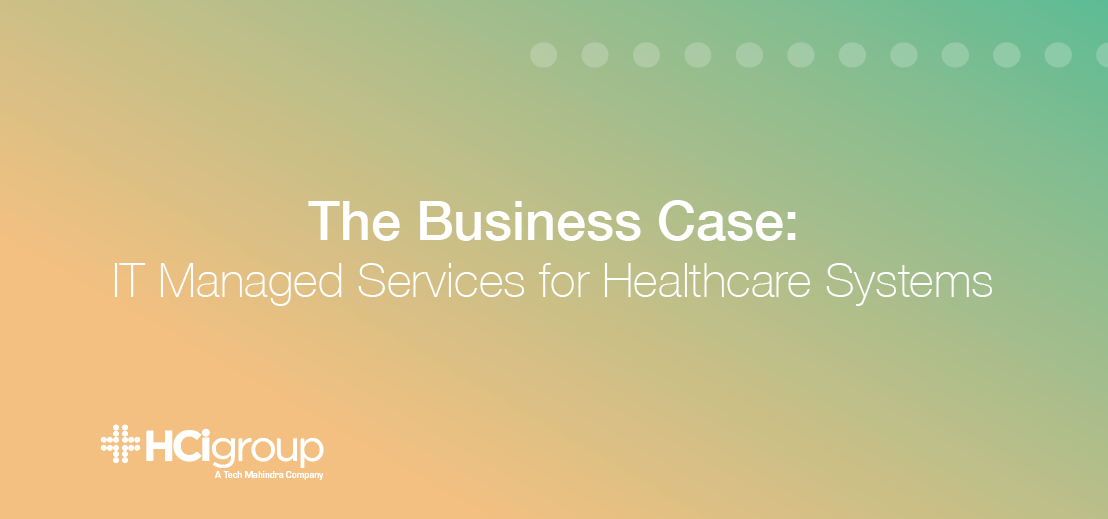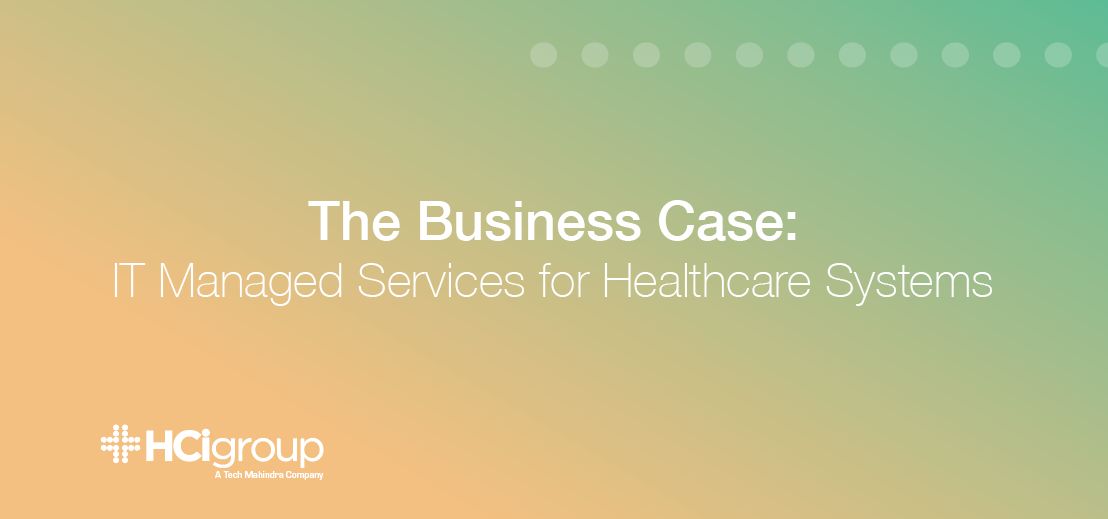The Business Case For IT Managed Services For Healthcare Systems

 With the myriad of healthcare IT solutions and services available in the current market, being a CIO and/or CTO can be very stressful. On the one hand, you’ve got lots of products and services to choose from, many of which are priced competitively to survive an oft saturated market. But on the other hand, there is so much noise in this space that it can be difficult to ascertain who offers the best value, what you really need, and who isn’t going to promise the world and deliver dismal results. Afterall, your budget is likely one of the biggest in your healthcare organization, so you’ve got to be prudent when choosing a healthcare IT partner and deciding which IT Managed Services are needed to make your health system thrive.
With the myriad of healthcare IT solutions and services available in the current market, being a CIO and/or CTO can be very stressful. On the one hand, you’ve got lots of products and services to choose from, many of which are priced competitively to survive an oft saturated market. But on the other hand, there is so much noise in this space that it can be difficult to ascertain who offers the best value, what you really need, and who isn’t going to promise the world and deliver dismal results. Afterall, your budget is likely one of the biggest in your healthcare organization, so you’ve got to be prudent when choosing a healthcare IT partner and deciding which IT Managed Services are needed to make your health system thrive.
Today we’re going to discuss the business case for the IT Managed Services in healthcare that you know you need to help your department(s) deliver the type of results and value that will make future budgetary asks far less offensive. We understand what you’re up against with conservative stakeholders, clinically-oriented board members, and a backlog of projects and needs that couldn’t be done in a timely manner with all the funds your hospital or health system could muster. Let us help clear the air a bit and focus on how leveraging Healthcare Managed Services can lighten your load while serving your patients, providers, and administrators.
Get The Most Bang For Your Buck From Existing Healthcare IT Solutions
In the case of an EHR implementation, for example, you’ve forked out the time, funds, and resources to support this mammoth project. Perhaps it’s humming along nicely and you’re past the newness of it all. However, you may circle back on what sold the project in the first place, and recall some ROI opportunities that may still be waiting in the wings. Or, more precisely, they’re waiting on you to make them possible.
One of the strongest selling points that health system administrators often resonate with is the ability to add efficiency to the care delivery process. This is especially potent if we’re talking about improved charge capture and increased patient throughput. But realizing these benefits is typically predicated on utilizing the tools to the fullest, something we observe that many CTO’s fail to drive. Of course, this doesn’t fall just on the shoulders of the CTO, but in the wake of an exhausting implementation process, the configurations and workflows enhancements get swept under the rug.
Application Visualization And Analytics Make The Need More Salient
Managed services for healthcare enables CTOs and CIOs to gather the data needed to revisit key initiatives and ensure that the full breadth of possibility for EHRs -- or any other healthcare IT solution -- is capitalized upon. Using health application visualization and analytics is a great way to resurface the need for additional work (and the corresponding resources and/or funds when you outsource, the latter of which can be very wise to support an already-burdened IT Department).
Let’s imagine that you’ve pulled the trigger on hiring a managed services provider to help your health organization prepare for a game-changing acquisition or payer contract. (Wise move!) Imagine the benefit to present to your ELT (Executive Leadership Team) a dashboard that shows you exactly where delays are occuring in clinical workflows, or identifies “hot spots” where charges are not being accurately captured at the time of service (and you’re therefore leaving money on the table or, worse, enduring the pain in a capitated population because you’re routinely losing reimbursements to undercoding). We’ve seen these tools help secure the traction and buy-in needed to make change possible and foster a willingness from the higher-ups to support technical initiatives that ultimately benefit everyone.

Know Your Limits When It Comes To IT Support
The security aspect of Infrastructure Management for healthcare organizations alone is enough to keep most CTOs awake at night. In an ever-increasingly complex and critical aspect of healthcare delivery, especially as the industry relies more heavily on electronic care support at every level, the viability and security of Health System IT Management is paramount. Unfortunately, the best human resources for cybersecurity are often either already well-established in the financial arenas, or they come with extensive specialization in the healthcare space, but you’re going to pay for that. This can make it prohibitive for many hospitals and health systems to keep this task in-house.
Hiring a competent and scalable IT Managed Services partner can go a long way in ensuring your data is locked down and your systems are secure. Knowing what tools you’ll be leaning on five to ten years from now is hard to imagine, but how much more powerful is your ability as a care delivery provider to survive whatever regulatory changes arise in the coming years by tapping into a firm that can take this off your plate and monitor the critical components of your technical architecture.
You Can’t Afford To Keep Complex Managed Services For Healthcare In House
We make this bold statement for large health systems because we understand all too well what’s at stake. Unless your organization has deep pockets and/or a deep understanding of the importance of solution management, CIOs often find themselves at the mercy of ill-experienced technology resources who are buckling under the weight of stern regulations handed down by HHS, CMS, and others. When noncompliance can cost your organization $100-$50,000 per violation -- i.e., per compromised health record -- up to $1,500,000, you can’t afford to wing it.
Relying on seasoned professionals who can carry the burden of this vital aspect of healthcare is crucial, especially when you’re on the path for growth and expansion. The more high-profile your hospital becomes, the more likely you will be targeted for PHI theft and cyber attacks. Take an offensive position and you’ll reap the benefits of a confident board and solid reputation.

